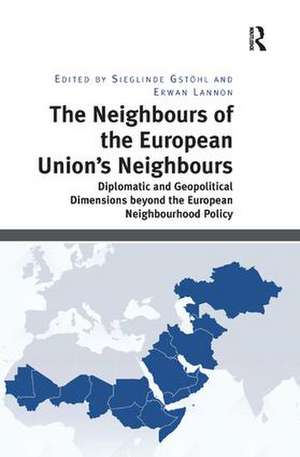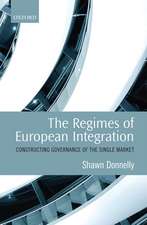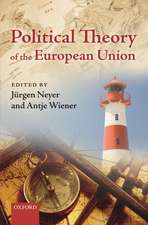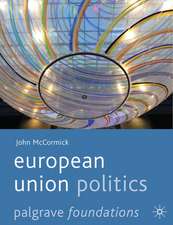The Neighbours of the European Union's Neighbours: Diplomatic and Geopolitical Dimensions beyond the European Neighbourhood Policy
Autor Sieglinde Gstöhl, Erwan Lannonen Limba Engleză Paperback – 14 aug 2018
| Toate formatele și edițiile | Preț | Express |
|---|---|---|
| Paperback (1) | 244.94 lei 6-8 săpt. | |
| Taylor & Francis – 14 aug 2018 | 244.94 lei 6-8 săpt. | |
| Hardback (1) | 681.41 lei 6-8 săpt. | |
| Taylor & Francis – 28 ian 2015 | 681.41 lei 6-8 săpt. |
Preț: 244.94 lei
Nou
Puncte Express: 367
Preț estimativ în valută:
46.88€ • 48.31$ • 39.58£
46.88€ • 48.31$ • 39.58£
Carte tipărită la comandă
Livrare economică 01-15 martie
Preluare comenzi: 021 569.72.76
Specificații
ISBN-13: 9781138360891
ISBN-10: 1138360899
Pagini: 352
Dimensiuni: 156 x 234 x 19 mm
Greutate: 0.45 kg
Ediția:1
Editura: Taylor & Francis
Colecția Routledge
Locul publicării:Oxford, United Kingdom
ISBN-10: 1138360899
Pagini: 352
Dimensiuni: 156 x 234 x 19 mm
Greutate: 0.45 kg
Ediția:1
Editura: Taylor & Francis
Colecția Routledge
Locul publicării:Oxford, United Kingdom
Notă biografică
Sieglinde Gstöhl is Director of Studies and Professor at the College of Europe in Bruges. Professor Gstöhl holds a Ph.D. in political science as well as an MA in International Relations from the Graduate Institute of International and Development Studies in Geneva, Switzerland, and an MA in Public Affairs from the University Of St. Gallen Switzerland. Her fields of interests are EU external relations, in particular EU trade policy and external representation, theories of regional integration and of international relations, global governance, international political economy, diplomatic training, and small states. Erwan Lannon is Professor in the EU International Relations and Diplomacy Studies Department in Bruges and Visiting Professor in the European Interdisciplinary Studies Department in Natolin. He is also Professor in European Law at the Faculty of Law of the Ghent University.Erwan holds a Master’s degree in International Politics and Strategic Studies from the Université Libre de Bruxelles, and a Ph.D. in European Law from the Université de Rennes I. He has worked as Researcher at Ghent University and then as an expert for several EU institutions, the EU Institute for Security Studies, Euromed networks and as consultant for the United Nations (UNDP) and the European International Movement.
Recenzii
’This book brings to our attention that the European Union is not just all about the concept of "ever closer union". In a number of illuminating chapters and case studies, The Neighbours of the European Union’s Neighbours clearly shows that regional cooperation with EU neighbours supplements integration within Europe and adds another dimension to regionalism and to the EU.’ Abdullah Baabood, Qatar University, Qatar ’Highly-recommended. In an era of ever-increasing interdependence, intertwined geopolitical challenges and widening transnational dynamics, this excellent innovative work offers valuable conceptual and practical tools for understanding and enacting creative and constructive diplomacy.’ Mohammad-Mahmoud Ould Mohamedou, Geneva Centre for Security Policy and Graduate Institute, Switzerland
Cuprins
Foreword: the neighbours of the European Union's neighbours, David O'Sullivan; Preface, Sieglinde Gstohl and Erwan Lannon; Introduction: the 'neighbours of the EU's neighbours', the 'EU's broader neighbourhood' and the 'arc of crisis and strategic challenges' from the Sahel to Central Asia, Erwan Lannon. Part I Geopolitical Dimensions beyond the ENP's South: Sahel and Horn of Africa: State of play: the EU, the African parties to the Cotonou Agreement and the ENP, Claudia Zulaika; The EU's growing engagement in the Sahel: from development aid to military coordination, Alexander Mattelaer; The Horn of Africa: transnational and trans-regional dynamics in Europe's broader neighbourhood, Alex Vines and Ahmed Soliman. Part II Geopolitical Dimensions beyond the ENP's East: Arabian Peninsula, Iraq and Iran: State of play: the EU, the Arabian Peninsula, Iraq, Iran and the ENP, Andrew Bower and Raphael Metais; The Gulf and the EU: partners or competitors?, Silvia Colombo; Iran and Iraq: between reconstruction and containment, Clement Therme. Part III Geopolitical Dimensions beyond the ENP's East: Central Asia: State of play: the EU, Central Asia and the ENP, Francesca Fenton; The Caspian Sea region: the struggle for resources, Alexander Warkotsch. Part IV Diplomatic Dimensions beyond the ENP: Lessons for EU Diplomacy: The European Neighbourhood Policy: a suitable case for treatment, Michael Leigh; Lessons for the practice and analysis of EU diplomacy from an 'outside-in' perspective, Stephan Keukeleire; The global players in the EU's broader neighbourhood, Jonatan Thompson. Conclusion: models of cooperation with the neighbours of the EU's neighbours, Sieglinde Gstohl. Annex, Maike Christiansen and Erwan Lannon; Index.
Descriere
What instruments does the EU have at its disposal and how can it link them in order to respond to the challenges and overcome the current fragmentation? How can the EU create bridges between the neighbours of its neighbours? This timely book takes stock of the state of the EU’s co-operation with these regions and explores how the concept might help promote security, stability and prosperity beyond the countries which are formally part of the European Neighbourhood Policy.













